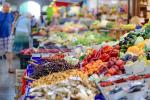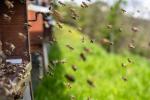H2020 IoF2020 Project: Internet of Food and Farm 2020
- Type Project
- Status Filled
- Execution 2017 -2021
- Assigned Budget 29.999.528,02 €
- Scope Europeo
- Main source of financing Horizon 2020
- Project website Proyecto IoF2020
The European food industry faces pressing challenges in ensuring sufficient, safe, and healthy food while maintaining its competitiveness. To address these issues, the EU-funded IoF2020 project will lead the acceleration of Internet of Things (IoT) technology adoption. With a consortium of 73 partners, including Wageningen University & Research and previous key project partners, IoF2020 seeks to foster a symbiotic ecosystem of farmers, food industry players, technology providers, and research institutes.
Through 19 use cases across five trials, the project will demonstrate the commercial potential of innovative IoT solutions for various agricultural sectors. By prioritizing user acceptability, stakeholder engagement, and sustainable business models, IoF2020 will lay the foundation for data-driven agriculture, autonomous operations, virtual food chains, and personalized nutrition for European citizens.
The use cases facilitated the sharing, reuse, and integration of IoT components. Therefore, a reference architecture with minimal interoperability mechanisms was defined, based on common IoT architectures, standards, and data models, but extended and adapted for agriculture and food. Each use case was a self-contained implementation of this architecture, ensuring maximum interoperability and reuse of components. Most of these results have been incorporated into subsequent projects (e.g., Atlas and Demeter) and leveraged through the FIWARE community. Designated organizations, such as AEF, AgGateway, and GS1, contributed to and adopted the standards. The implementation of each use case is described in the IoT catalog. Business support was provided to the use cases in terms of KPI monitoring, business model development, user acceptance testing, market research, and governance aspects (including data ownership, privacy, liability, and ethical issues).
This has resulted in market adoption of IoT solutions or components; more than half of the use cases generated revenue during the project's lifetime. Other use cases, at least, have taken significant steps toward commercializing their solutions. The activities and experiences were compiled into a business modeling toolkit that will be used in subsequent projects, particularly the SmartAgriHubs project.
Another outcome is the significant contribution to the Code of Conduct for Agricultural Data Sharing, the development of which will be included in new projects. Lessons learned from the use case, relevant to the public sector, have been compiled in a report on policy recommendations. IoF2020 actively and successfully collaborated on the development and expansion of the various ecosystems, both at the use case and project levels, and beyond, through communication, dissemination, and the organization of workshops, demonstrations, and events. This was achieved through the active participation of European and national IoT supply- and demand-side communities, including industry associations and cooperatives, European Innovation Partnerships, Technology Platforms, and ERAnets. This has led to significant quantitative and qualitative growth of the IoF2020 ecosystem.
The Internet of Things (IoT) has revolutionary potential. An intelligent network of sensors, actuators, cameras, robots, drones, and other connected devices enables an unprecedented level of control and automated decision-making. The Internet of Food & Farm 2020 (IoF2020) project has explored the potential of IoT technologies for the European agri-food industry.
The goal was ambitious: to make precision agriculture a reality and take a crucial step toward a more sustainable food value chain. With the help of IoT technologies, higher yields and better-quality products will be achieved. The use of pesticides and fertilizers will be reduced, and overall efficiency will be optimized. IoT technologies also enable better food traceability, resulting in greater food safety. Thirty-three use cases organized around five trials (crops, dairy, fruit, meat, and vegetables) developed, tested, and demonstrated the use of IoT technologies in an operational agricultural environment across Europe. IoF2020 utilizes an efficient, multi-stakeholder approach, focusing on user acceptability, stakeholder engagement, and the development of sustainable business models.
The IoF2020 project is dedicated to accelerating IoT adoption to ensure sufficient, safe, and healthy food and strengthen the competitiveness of agricultural and food chains in Europe. It will consolidate Europe's leading position in the global IoT industry by fostering a symbiotic ecosystem of farmers, the food industry, technology providers, and research institutes. The IoF2020 consortium of 73 partners, led by Wageningen University and other core partners from previous key projects such as FIWARE and IoT-A, will leverage the ecosystem and architecture established in those projects.
The core of the project is 19 use cases grouped into 5 trials with end-users from the agricultural, dairy, fruit, vegetable, and meat verticals and IoT integrators that will demonstrate the business case for innovative IoT solutions across a wide range of application areas. An agile, multi-stakeholder approach focused on user acceptability, stakeholder engagement, and sustainable business models will boost technology and market readiness and take end-user adoption to the next stage. This development will be further enhanced by an open IoT architecture and infrastructure of reusable components based on existing standards and a security and privacy framework. Anticipating vast technological developments and emerging challenges for agriculture and food, the 4-year project remains agile through dynamic budgeting and adaptive decision-making by an implementation board of representatives from key user organizations.
A €6 million mid-term open call will allow for testing of intermediate results and expanding the project with technical solutions and test sites. A coherent dissemination strategy for use case products and project learnings supported by leading user organizations will ensure high market visibility and a steeper learning curve. IoF2020 will thus pave the way for data-driven agriculture, autonomous operations, virtual food chains, and personalized nutrition for European citizens.
The use of IoT technologies not only enables a more sustainable use of resources, making processes more economical and environmentally friendly, but also increases productivity and product quality. This EU-funded project has established ways to further integrate technology. The demand for food continues to grow, resulting in the intensification and industrialization of the agricultural sector. But technology can help. From food safety to environmental protection, the Internet of Things has immense potential when it comes to food production and distribution, a fact that the EU IoF2020 project has quickly embraced. "The IoF2020 project, as a large-scale pilot, is attracting interest from external parties, SMEs, farmers, universities, machinery manufacturers, IT companies, along with regional authorities and policymakers. All participants are part of the IoF2020 ecosystem," explains Mr. François Lienard, Communications and Outreach Manager. From start to finish, IoT makes things more efficient. The benefit of useful data can be felt across the industry.
In the wine optimization use case, multiple data sets are extracted from different fields, such as weather data, rainfall density, soil moisture, leaf color, and insect density. The data sets are compiled into a dashboard that the winemaker can use to gain insights that help them work more efficiently and with faster reaction times. As Lienard explains: "This works in wineries, where sensors and spectrometers measure the fermentation and temperature of the wine in real time and can alert the winemaker immediately. This saves crucial time and effort compared to traditional laboratory analysis."
In crop fields, IoT sensors connected to specially designed interfaces will tell farmers whether the soil contains enough moisture, helping them decide whether or not to irrigate crops and direct irrigation where it's needed. Similarly, regarding crop health, spectrometry will tell them if a disease is about to spread in a field and exactly where the outbreak is located.
Farmers can know whether to treat only a small fraction of the field, and they can do so even before the disease begins to spread. "This type of technology is used in all of our use cases and other similar initiatives. IoF2020 is an 'innovation action.'" This means that the solutions we are developing should be market-ready by the end of the project in 2020. The project is keen to find these market-ready solutions: it has nearly 90 implementation centers across Europe that develop, test, and validate them. Use case participants are coordinated by a project leader, and each use case focuses on testing IoT solutions applicable to the challenges facing its sector.
The project leverages the perspectives of a wide range of experts. "Farmers are involved, along with research centers, large industries, and innovative SMEs," explains Lienard. "The goal of IoF2020 is to cover the entire agri-food value chain, so they also involve and target players in the distribution and logistics sectors." A changing legal framework. The use and storage of data is currently a central topic of debate at the EU level. "We can work on mutually beneficial business models and use these results to contribute to the development of upcoming regulations," says Lienard. The results are more than satisfactory, and IoF2020 is expected to increase its reach and impact with the addition of new members in early 2019. This will bring new use cases and countries to the project, and potentially, new agri-food sectors.
From the outset, use cases were required to define their economic, ecological, and social impact, establishing clear and ambitious key performance indicators across these three pillars of sustainability. For many of these indicators, significant improvements could be demonstrated through the use of IoT technologies. By fostering a symbiotic ecosystem of technology providers and agri-food sector players, IoF2020 has helped consolidate Europe's leadership in the global IoT industry.
A significant contribution was made to the development of open standards and platforms. This has generated new opportunities for entrepreneurs, fostering new market opportunities, providing access to valuable data sets and direct interactions with users, and expanding local businesses on a European scale.
The innovation was carried out responsibly, focusing on validating user acceptance, considering privacy, security, vulnerability, responsibility, needs, concerns, and expectations of users regarding IoT solutions. In this way, it is expected to impact the quality of life of European citizens, both in the public and private spheres, in terms of autonomy, convenience and comfort, participatory approaches, health and lifestyle that provides greater well-being for farmers, food safety traceability, and environmental protection. Overall, IoF2020 contributed to safer and more adequate food for future generations of European citizens.
The IoF2020 project demonstrated how IoT can be implemented and used in agriculture and food production across various sectors and application areas. This was achieved through the integration and reuse of available IoT technologies based on open architectures and standards. Thanks to active business support, many solutions or components have already been commercialized, ensuring large-scale adoption, and others have made significant progress towards commercialization. A broad and coherent European ecosystem has developed, which will continue to grow and prosper through new projects and digital innovation centers, particularly supported by the SmartAgriHubs project.
In this way, IoF2020 has promoted large-scale adoption of IoT in the European agricultural and food sector, boosting digital innovation and, consequently, improving productivity and sustainability.
- STICHTING WAGENINGEN RESEARCH (WR)







